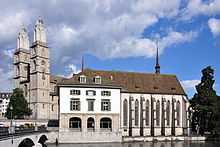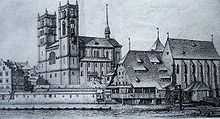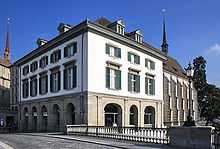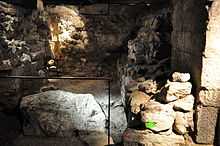Wasserkirche
Coordinates: 47°22′10.6″N 8°32′36.0″E / 47.369611°N 8.543333°E


The Wasserkirche ("Water Church") of Zürich, first mentioned as ecclesia Aquatica Turicensi around 1250 and as wazzirkilcha in 1256, is a church built on a small island in the Limmat, situated between the two main churches of medieval Zürich, the Grossmünster and the Fraumünster, at the Limmatquai and the Münsterbrücke.
Overview
The site was likely used for cultic congregations since antiquity, centered around a stone now in the crypt of the church, in medieval tradition taken to be the place of execution of Saints Felix and Regula. A first church was built in the 10th century, and reconstructed in various stages, culminating in a complete reconstruction completed in 1486. In the course of the Reformation, the Wasserkirche was identified as a place of idolatry, and it was secularised, becoming the first public library of Zürich in 1634, which became a focus of learning that greatly contributed to the foundation of University of Zürich in the 19th century. The island was connected with the right bank of the Limmat in 1839 with the construction of the Limmatquai. The library was merged into the Zentralbibliothek in 1917, and the church was used as a storage room for crops for some time, until reconstruction work and archaeological excavations were undertaken in 1940, following which the building has again been used for services by the Evangelical-Reformed State Church of the Canton of Zürich.

The Helmhaus is an extension of the church to the north, first mentioned in 1253 as a court of criminal justice, at which time it was a simple wooden structure covering the eastern end of the bridge. It was extended to a larger wooden structure in 1563, and replaced with a stonework hall in 1791.
References
![]() Media related to Wasserkirche at Wikimedia Commons
Media related to Wasserkirche at Wikimedia Commons
- Konrad Escher, Die Kunstdenkmäler des Kantons Zürich, vol. IV, "Die Stadt Zürich", Basel 1939, pp. 300–310.
